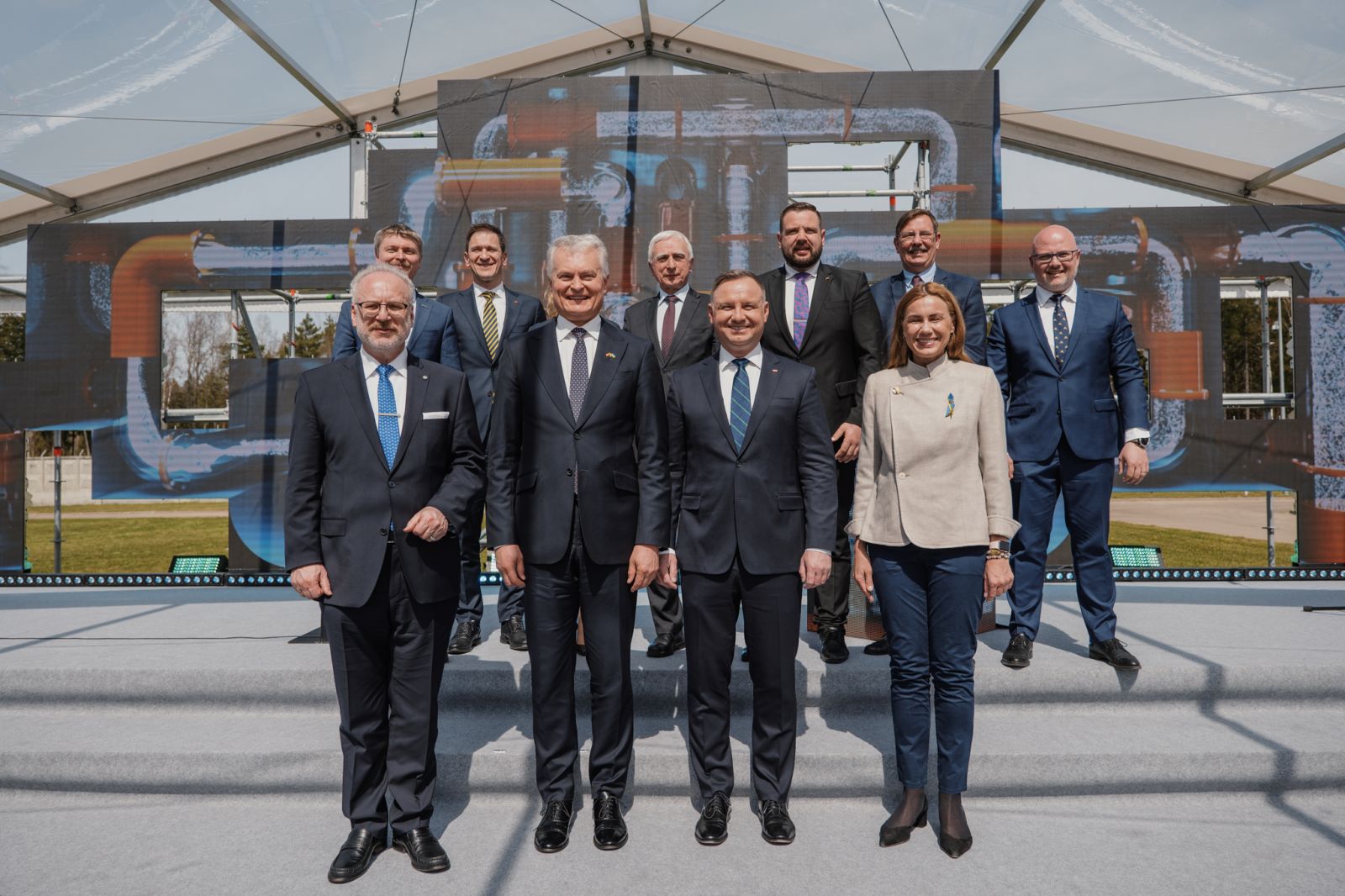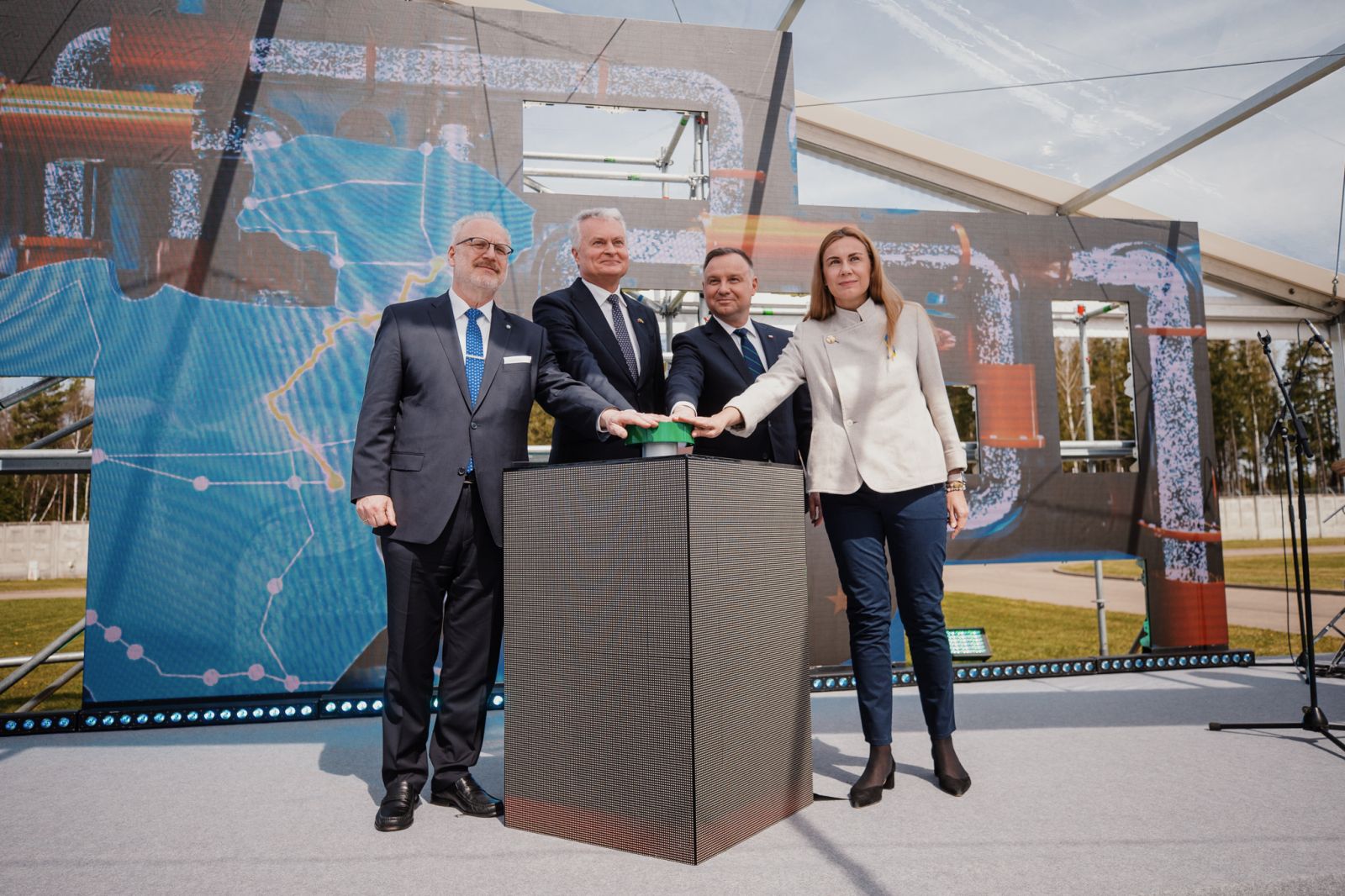The Lithuanian-Polish gas pipeline GIPL, which became operational in May, ended the energy isolation of the Baltic States and Finland, integrating the countries into the EU’s single gas network. The new gas import and export route was officially opened on 5 May thus marking a historic event for a region that has long been an energy island, heavily dependent on Russian gas imports. The long-awaited GIPL pipeline strengthens the region’s energy independence and allows the full potential of the Klaipėda LNG terminal to be exploited.
The official opening of the GIPL gas interconnector took place at the Jauniūnai Gas Compressor Station, one of the main hubs of the Lithuanian gas infrastructure, where the GIPL gas interconnection with Poland starts. The ceremony was attended by the Presidents of Lithuania, Poland and Latvia, the European Commissioner for Energy, and the Baltic and Polish Ministers responsible for energy.
The 508 km long GIPL pipeline has effectively expanded the European gas market by integrating the Baltic States and Finland. In a changed geopolitical situation due to the war in Ukraine caused by Russia, the GIPL pipeline, together with the Klaipėda LNG terminal, has become an energy security infrastructure not only for Lithuania, but also for Poland and the whole Baltic region.
"The launch of GIPL is a historic event not only for Lithuania and Poland, but also for the whole energy sector in the region. The Lithuanian-Polish gas interconnection will ensure the security of gas supply in the Baltic States and strengthen our energy independence, which is critically important against the backdrop of the current geopolitical developments," says Dainius Kreivys, Minister of Energy of Lithuania.
“Today, ahead of previously announced deadlines, we are starting gas transmission through the Polish-Lithuanian interconnector. Poland gains access to the Klaipeda terminal, which strengthens the security of gas supply to Polish consumers. Lithuania, Latvia and Estonia are coming to the end of gas isolation era and, through Poland, are connecting their transmission systems to the vast European market, which offers the possibility of acquiring the resource at competitive market prices. Together, we are also strengthening our countries’ resilience to the gas crisis we are experiencing right now. In the situation created by Russian aggression near our borders, the GIPL, together with other projects being implemented by GAZ-SYSTEM such as the Baltic Pipe, the interconnector with Slovakia and the expansion of the LNG Terminal in Świnoujście, makes it easier for Europe to overcome dependency on the unreliable and aggressive supplier from the East” – said Minister Piotr Naimski, Government Plenipotentiary for Strategic Energy Infrastructure.

The construction of the GIPL interconnector is the largest investment in the development of Lithuania’s gas transmission system since the restoration of its independence. The GIPL project was implemented by Lithuanian and Polish gas system operators Amber Grid and Gaz-System. The total value of the project is around €500 million, with the European Commission providing around 60% of the funding. The Latvian and Estonian gas transmission system operators have also been contributing to the financing of the project.
“The Lithuanian-Polish gas interconnector GIPL was a missing part of Lithuania’s energy system, important not only for ensuring energy security but also for the affordability of energy resources for consumers. The Baltic States and Finland finally have a wide choice of gas suppliers in the open market of continental Europe, while Poland has a new alternative source of gas supply. GIPL, together with the Klaipėda LNG terminal and the ELLI project, which will double the gas transmission capacity between Lithuania and Latvia, will bring the regional gas market to a whole new level of competitiveness,” said Nemunas Biknius, CEO of Amber Grid.
Mr Biknius stressed that the infrastructure in place would allow for a rapid move towards a green energy transformation, gradually replacing natural gas with green gas produced from renewable energy sources. In the long term, this will allow European countries to further increase their energy independence from external energy sources.
“The connection between the gas systems of Poland and Lithuania being opened today is the first of the new interconnectors to be launched by GAZ-SYSTEM this year. The Russian invasion of Ukraine and the fact that the Russians have withheld gas transmission to Poland from the east have only confirmed that the decisions taken over six years ago by GAZ-SYSTEM concerning the construction of new transmission infrastructure were well-justified and necessary. Thanks to projects such as GIPL, our national gas system is becoming more resilient to gas supply disruptions, and countries such as Lithuania, Latvia, Estonia and Finland are gaining access to a new gas corridor from the European market” – said Tomasz Stępień, President of GAZ-SYSTEM.
Over the next five months, GIPL's capacity to transport gas from Lithuania to Poland via the Klaipėda LNG terminal will reach 217,000 m3/h or 2.4 GWh/h. This corresponds to 1.9 bcm/year or 21 TWh/year. The capacity to transport gas from Poland to Lithuania will be 230 000 m3/h or 2.6 GWh/h. This corresponds to 2 bcm/year or about 22 TWh/year.
GIPL Commissioning Ceremony
video.

